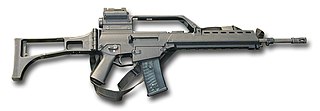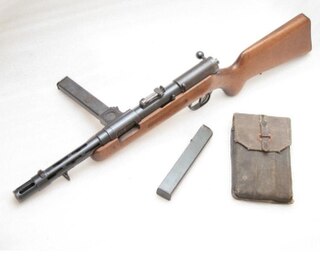| GmbH | |
| Founded | 1840 |
| Founder | Carl Gottlieb Haenel |
| Headquarters | , |
| Products | Firearms |
| € 8 million (2018) | |
Number of employees | 9 (2018) |
| Parent | Merkel |
| Website | https://www.cg-haenel.de/ |
C. G. Haenel is a German weapon manufacturer located in Suhl, Germany.
| GmbH | |
| Founded | 1840 |
| Founder | Carl Gottlieb Haenel |
| Headquarters | , |
| Products | Firearms |
| € 8 million (2018) | |
Number of employees | 9 (2018) |
| Parent | Merkel |
| Website | https://www.cg-haenel.de/ |
C. G. Haenel is a German weapon manufacturer located in Suhl, Germany.

The Prussian commissioner for firearms manufacturing, Carl Gottlieb Haenel, began producing bicycles and weapons in 1840 — a combination which was not uncommon at the time as it required similar means of production and skills. In 1887, the Suhl-based weapons designer C. W. Aydt joined the company in order to produce his Aydt target rifle and later the Aydt target pistol for sporting. [1] In 1879, the German Army introduced the M1879 Reichsrevolver and a smaller derivative, the M1883. Haenel was awarded a share of the manufacturing for these firearms as part of a consortium, named the Suhl Konsortium, formed with the sporting arms manufacturer V. Ch. Schilling. The firearms they produced were marked with the signature "VCS CGH Suhl" in reference to their initials and Suhl origin. Haenel later produced hunting weapons, bayonets and, during World War I, produced vast quantities of the Mauser Model 98 for the German Army.
In 1921, Hugo Schmeisser joined the company which then began manufacturing pocket pistols based on his designs. [2] This period also marked the introduction of the automatic firearm and, despite a ban by the Treaty of Versailles, the company began developing automatic submachine guns to Schmeisser's designs. Schmessier drew upon experience and knowledge he had gained from his father, Louis Schmeisser, otherwise known as the "Father of the Automatic Carbine" due to his work on Bergmann machine guns. [3] In 1928, the company developed the MP28, a submachine gun derived from the MP18, and it was in use with the German police by 1928. Deliveries were also made to South Africa, Spain, Japan and the Republic of China through a license agreement with a Belgian company, named Baynard.

Despite the success of Hugo Schmeisser, the company ran into bankruptcy several times between 1929 and 1934. [4] In 1933, the company formed an association with ten other Suhl and Zella-Mehlis arms companies to guarantee a share of armament contracts from the newly-arisen Nazi government. This association was named the United Suhl-Zella-Mehlisser Arms Factories (German : Vereinigte Suhl-Zella-Mehlisser Waffenfabriken) and had direct relations with the Wehrmacht administration. The company, along with its associates, established their own offices in Berlin. [4] [5]
1935 saw a dramatic increase in arms production in the build up to World War II and a new automatic firearm with a short cartridge and 7.92 × 33 mm caliber was developed. The MP43 (originally known as the Mkb42) was devised to stand out from the MP38/MP40 with its higher performance and economic design which was manufactured through a novel factory stamping technique. Over 10,000 units were produced as early as 1943 but, in the same year, production was halted by Adolf Hitler. Hitler later approved mass production following testing with troops. On entering service, the weapon was known as the Sturmgewehr 44 (StG 44).
Following the defeat of Nazi Germany in World War II, U.S. forces briefly occupied the city of Suhl and imposed a production ban on all arms factories. Following the evacuation of American troops, the area became occupied by the Soviet Army in what would later become East Germany. Around 50 StG 44's were transferred to the Soviet Union for technical analysis, as well as 10,785 weapon blueprints which were considered war reparations. [4] The company was then consolidated as the VEB Vehicle and Hunting Weapons Factory "Ernst Thälmann" (German : VEB Fahrzeug- und Jagdwaffenwerk „Ernst Thälmann“) and later began producing air rifles and hunting carbines under the brand name Haenel Suhl.


In 2008, the company adopted its original name of C. G. Haenel. [6] It now belongs to Merkel, which is in turn part of Caracal International in the United Arab Emirates. [7] The company's first product in 2008 was the Haenel RS8 sniper rifle which, in 2009, lead to the development of a larger Haenel RS9 version with a .338 Lapua Magnum caliber. That same year saw the introduction of a new range of hunting rifles, named the Jaeger 8 series. This was followed by the single-shot Jaeger 9, the Jaeger 10, the SLB 2000+, which was originally developed by Heckler and Koch, and the Jaeger 11 shotgun.
In February 2016, the Bundeswehr ordered the Haenel RS9 as its new medium-range sniper rifle, designated the G29. [8] This was followed by an order from the Hamburg Police for the company's Haenel CR 223 semi-automatic rifle in November. These were reportedly withdrawn from use in 2017 due to persistent jamming. [9] These problems were attributed to the ammunition being used by the Hamburg Police and Haenel stated it would rectify the problem. [10]
In January 2019, the company's MK 556 was shortlisted alongside the Heckler and Koch HK416 and HK433 as a potential replacement for the Bundeswehr's G36 service rifle. The competition was widely expected to be won by Heckler and Koch which has supplied previous service rifles to the German military, including the most recent two, the G3 and the G36. [11] However, despite expectations, the Bundeswehr selected the MK 556 on 15 September 2020. The contract, currently worth €245 million, is to deliver 120,000 rifles. [12]
Products manufactured by C. G. Haenel include:

Heckler & Koch GmbH is a German defense manufacturing company that manufactures handguns, rifles, submachine guns, and grenade launchers. The company is located in Oberndorf am Neckar in the German state of Baden-Württemberg, and also has subsidiaries in the United Kingdom, France and the United States.

The MP 40 is a submachine gun chambered for the 9×19mm Parabellum cartridge. It was developed in Nazi Germany and used extensively by the Axis powers during World War II.

The StG 44 is a German selective-fire assault rifle developed during World War II. It is also known as the MP 43 and MP 44.
Carl Walther GmbH Sportwaffen, or simply known as Walther, is a German weapon manufacturer, and a subsidiary of the PW Group. Founded by Carl Walther in 1886, the company has manufactured firearms and air guns at its facility in Germany for more than 100 years. Walther Arms, Inc. is the United States Walther business unit and is based in Fort Smith, Arkansas.

The G3 is a 7.62×51mm NATO, select-fire battle rifle developed in the 1950s by the German armament manufacturer Heckler & Koch (H&K) in collaboration with the Spanish state-owned design and development agency CETME.

The G36(Gewehr 36) is a 5.56×45mm assault rifle, designed in the early 1990s by German company Heckler & Koch as a replacement for the heavier 7.62mm G3 battle rifle. It was accepted into service with the Bundeswehr in 1997, replacing the G3. Since then, it has also been a popular export, and the G36 has seen active service in military and police units in several countries, including Germany, Spain, and the United Kingdom. The G36 is gas-operated and feeds from a 30-round detachable box magazine or 100-round C-Mag drum magazine.
Gewehr is the German word for a rifle. Prior to the 1840s, rifled guns were not widespread, usually muzzle-loading and termed Büchse, as they are still in German hunting jargon today. Afterwards, Gewehr became the standard term for military-type rifles.
Hugo Schmeisser was a German developer of 20th century infantry weapons.

The MP35 was a submachine gun used by the Wehrmacht, Waffen-SS and German police both before and during World War II. It was developed in the early 1930s by Emil Bergmann and manufactured at the Bergmann company in Suhl.

J. P. Sauer und Sohn GmbH is a manufacturer of firearms and machinery and is the oldest firearms manufacturer still active in Germany. The products of this company are frequently referred to as Sauer.

The Heckler & Koch HK417 is a battle rifle/designated marksman rifle designed and manufactured by Heckler & Koch in Germany. It is the larger caliber version of the HK416, and chambered for the 7.62×51mm NATO rifle cartridge. It is a gas-operated, selective fire rifle with a rotating bolt. The HK417 is intended for use in roles where the penetrative power, stopping power, and range of the 7.62×51mm cartridge are required. It has been adopted for service by a number of armed forces, special forces, and police organizations.

The StG 45(M) sometimes referred to as the MP 45(M), was a prototype assault rifle developed by Mauser for the Wehrmacht at the end of World War II, using an innovative roller-delayed blowback operating system. It fired the 7.92×33mm Kurz intermediate cartridge at a cyclic rate of around 450 rounds per minute.
The evolution of German military rifles is a history of common and diverse paths followed by the separate German states, until the mid-19th century when Prussia emerged as the dominant state within Germany and the nation was unified. This article discusses rifled shoulder arms developed in or for the military of the states that later became Germany; it excludes firearms of the Austrian Empire, except where they were used substantially by German troops.

An assault rifle is a selective-fire rifle that uses an intermediate cartridge and a detachable magazine. Assault rifles were first put into mass production and accepted into widespread service during World War II. The first assault rifle to see major usage was the German StG 44, a development of the earlier Mkb 42. Though Western nations were slow to accept the assault rifle concept, by the end of the 20th century they had become the standard weapon in most of the world's armies, replacing full-powered rifles and sub-machine guns in most roles. Examples of assault rifles include the StG 44, AK-47 and the M16 rifle.

Dr. Ludwig Vorgrimler is the man most commonly associated with the design of the Spanish roller-delayed CETME rifle, and its prolific offspring from the German gunmaker Heckler & Koch such as the G3, HK21, P9 and MP5.

The Erfurter Maschinenfabrik (ERMA) was a German weapons manufacturer founded in 1922 by Berthold Geipel. Prior to and during World War II it manufactured many firearms, including the Karabiner 98k, the MP40 and other submachine guns.

The Maschinenkarabiner 42(H) or MKb 42(H) was an early German assault rifle that was designed in 1940-41 by Hugo Schmeisser working for C. G. Haenel Waffen und Fahrradfabrik during World War II. The MKb 42(H), along with the less successful Maschinenkarabiner 42(W) designed by Walther Waffenfabrik AG, were predecessors of the later Sturmgewehr 44 or StG 44 assault rifle.

The Maschinenkarabiner 42(W) or MKb 42(w) was an early German assault rifle designed in 1940-41 by Walther during World War II. The Mkb 42(W), and the more successful Maschinenkarabiner 42(H) designed by Haenel, were predecessors of the later Sturmgewehr 44 or StG 44 assault rifle.

The CAR 816, also called Caracal Sultan or simply Sultan, is a 5.56×45mm NATO, gas-operated, magazine-fed assault rifle that is produced by Caracal International in Abu Dhabi, United Arab Emirates. The rifle is also called Sultan in memory of the Emirati Colonel Sultan Mohammed Ali al-Kitbi who was killed in action in Saudi-led intervention in Yemen.

The Haenel MK 556 is a gas-operated selective-fire 5.56×45mm NATO assault rifle designed by C. G. Haenel in Germany. It is a fully automatic version of an earlier Haenel design, the CR223, which was already in limited use by law enforcement agencies. On 14 September 2020, a Haenel MK 556 variant was selected by the Bundeswehr as a replacement for the G36, making it the first service rifle used by the Bundeswehr by a company other than Heckler & Koch.